Posted by Jinnistan  8/04/2024 9:00 pm | #21 |
Along with the private detective genre - very popular on TV since at least Peter Gunn - the more typical "cop show" was evolving from the likes of Dragnet and Adam 12. Streets of San Francisco was the first step towards reflecting the more gritty attitude in the post-Dirty Harry/French Connection era of crime cinema. Starksy and Hutch, which premiered in 1975, would go further with the street vice and violence while its stars established a fresh ethos of undercover attire and camaraderie that was directly evident in a few buddy-cop films from the previous year, 1974.
On the hardcore and controversial side of the spectrum, this film was based on a non-fiction account of the exploits of two NYPD detectives. While this gives the film (directed by Gordon Parks) a sense of authenticity, that same authenticity is undermined by the ensuing fact that these cops were almost certainly corrupt and. although the film shows them as ethically compromised (to be polite), they were likely much worse, and many details from their book have been called into question, and which may have been included to cover up their corruption.
Probably due to this controversy, the film was unavailable for many years but finally received a restored DVD release in the past decade. The film is quite entertaining on its own merits, regardless of its accuracy or its sources. And not only did Starsky and Hutch claim direct inspiration from these real-life cops, there was even a competing Super Cops TV pilot.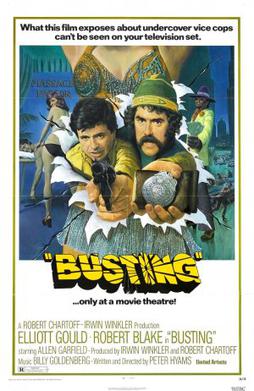
This film is also considered a direct inspiration for Starsky and Hutch. It doesn't quite ride so heavy on the ethically questionable implications of undercover work, presenting these cops as ultimately morally upstanding. However that, as well, is a bit undermined by more modern reassessments of the film's depiction of the LA homosexual underground. The kindest take is that this was, after all, most likely an accurate reflection of police attitudes at the time.
Easily the most entertaining film of the bunch, due to great chemistry between the leads, James Caan and Alan Arkin, some jaw-dropping car stunts and director Richard Rush's decision to lean heavily into comedy. That latter element also has the benefit of disarming some of the more problematic stuff in the film, which is plenty. Foremost is "The Bean", which is the Mexican cop's nickname (a Mexican, btw, played by a Jew). "Freebie" is also far less troubled by taking bribes, or even straight-up mugging if a bribe is not forthcoming. And again, homosexuality is not only a punchline but a motive for sociopathy. The primary antagonist, who's a transsexual, is perversely listed in the credits as simply "Transvestite".
But if you get past all of that, it really is a terribly enjoyable picture.
This only slightly qualifies, but I'll allow it. This buddy-comedy involves working-class New Yorkers, Carroll O'Connor (at the time indistinguishable from Archie Bunker) and Ernest Borgnine, joining a volunteer police force, deputized to help with the overwhelming petty crime on the streets. The latter gritty NYC steet vibes are definitely very much in the 1974 vein, but in addition the film throws in a lot of generational commentary/comedy on race, sex and drugs, and ultimately on class struggle. Czech transplant Ivan Pressor offers a much better NYC slum-comedy film in his second film than his previous Born To Win, which miscast George Segal as a heroin addict.
Law and Disorder is also significant as a more humane response to that other, much more sour, trend in urban action films....
Posted by Rock  8/04/2024 9:11 pm | #22 |
Yeah, Freebie and the Bean is a good time.
I am not above abusing mod powers for my own amusement.
Posted by Jinnistan  8/05/2024 3:31 am | #23 |
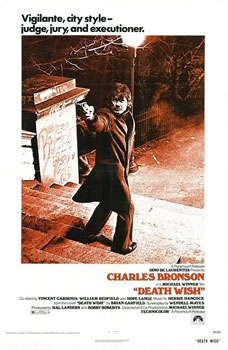
This piece of shit tries to take the same socially conservative frustrations that fueled Joe and Dirty Harry, removing all of the ethical ambiguity, and in terms of the latter completely ignoring the corrective challenge from Magnum Force, and diving right into wallowing into fascistic self-righteous grievance-fueled violence. In order to show the extremity of the film's authoritarian politics (as opposed to being a more reasonable reaction to the contemporary urban crime wave), you only have to compare it to its Dirty Harry inspiration. For example, note how Harry takes care to show that those representatives of 1960s social progress - namely 'hippies' and minorities - are shown to just as frequently be the victims of crime as criminals themselves. Death Wish makes no such effort. In this world, the white bourgeoisie are the sole victims of those sex-crazed drug addict hoodlums. But the central presumption of Death Wish is the ultimate cynical assertion that criminals are de facto privileged over victims by those pillar institutions of power, the police and the media. While Dirty Harry may wrestle with post-Miranda constraints on policing, it never truly abandons the legal system (again re-empthasized in its sequel). But Death Wish avoids any complexity, and so what if your wife and daughter are raped and killed? Too bad, buddy. What can you do? But as soon as a couple of dead junkies start showing up down by river? It's suddenly a five-alarm all-hands-on-deck and send out the homegrown Poirot (Vincent Gardinia)! The film's underlying sadism and sense of social impotence is clear, but would increase with its own sequels, and is doubly insulting with the detail of making Bronson's character into a fool for having previously been a pacifist. As Quentin Tarantino rightly observed, Death Wish is the sociopathy that Taxi Driver would later satirize.
Not to completely throw Bronson under the bus. Sometimes people have forgotten his strengths as a screen presence. The comparisons of this film to Death Wish, which was released barely two weeks afterward, reveal a number of reasons for why the latter is ultimately debased. First of all, Majestyk happens to be a more believable Charles Bronson character, or at least more comfortable to his strengths. (Did anyone actually see him as a pacifist architect?) Second, organized crime is a lot more formidable an opponent than petty street hoods. And here, we get at least a semblence of dignity thrown onto Mexican laborers. Finally, the journeyman director Richard Fleischer is a far superior talent than the sleepy, sleazy Michael Winner. Basically, the only thing this has in common with Death Wish is that the police aren't any help at all.
Maybe worse than bad politics is stale politics. The book came out in 1967 - the year of In the Heat of the Night - and the fact that this film looks already badly dated in 1974 is a testament to the rapidity of cultural change during those intervening years. Another "well-intentioned" but flaccid exercise, the film is hardly progressive, as we understand the term, but weakly supportive of the stagnant status quo. (Or worse, it's merely exploitative, which is more likely.) In addition to the film looking a decade old at this point, the stars, Lee Marvin and Richard Burton, were sauced to the gills, even by their own notorious standards - neither one could remember making the film. Only O.J. Simpson, for completely unforseen reasons, manages to almost make this entertaining, as a comedy, in today's light.
Posted by Rock  8/05/2024 1:05 pm | #24 |
Not that I agree with Death Wish’s politics, but I do remember finding it a pretty effective movie, if mostly on the strength of Bronson’s quiet performance. I’m well overdue for a rewatch, although I’ve seen 2-4 a bunch of times. 3 is the best one, obviously.
That being said, while I like late period Bronson, it’s a shame that he went into that low energy mode for the rest of his career, as things like Mr. Majestyk and Breakout show that he could be quite charismatic and animated. I think Red Sun is another good showcase for him in that mode. And I think he has more life when paired with his wife Jill Ireland. From Noon till Three is a good one to show how they worked together.
I am not above abusing mod powers for my own amusement.
Posted by Rock  8/05/2024 1:06 pm | #25 |
Also, apparently Don Siegel was relatively liberal in his personal politics while Winner was not, which is probably why Dirty Harry doesn’t play as a pure political screed. That and the fact that Siegel was a much better director than Winner in just about every respect.
I am not above abusing mod powers for my own amusement.
Posted by Jinnistan  8/05/2024 8:34 pm | #26 |
Rock wrote:
That being said, while I like late period Bronson, it’s a shame that he went into that low energy mode for the rest of his career, as things like Mr. Majestyk and Breakout show that he could be quite charismatic and animated. I think Red Sun is another good showcase for him in that mode. And I think he has more life when paired with his wife Jill Ireland. From Noon till Three is a good one to show how they worked together.
With Ireland, I think Violent City and Cold Sweat are pretty good, but Hard Times has to be his best from the '70s.
I like a lot of his early TV work. He did a few Alfred Hitchcock Presents, one in particular with Claude Rains about a possessed ventriliquist doll. But the classic was his Twilight Zone episode, "Two" with Elizabeth Montgomery, which I believe was wordless or nearly so.
Rock wrote:
Also, apparently Don Siegel was relatively liberal in his personal politics while Winner was not, which is probably why Dirty Harry doesn’t play as a pure political screed. That and the fact that Siegel was a much better director than Winner in just about every respect.
I agree. Unfortunately, I haven't seen Siegel's 1974 film, Black Windmill.
Posted by Jinnistan  8/05/2024 9:27 pm | #27 |
Now back to some good movies...
This is the best New York City crime film of the year. Tightly plotted and paced, textbook entertainment. Walter Matthau and Robert Shaw have remarkable chemistry despite rarely sharing a scene together, and features that secret ingredient of all obvious classics: Martin Balsam.
After scripting the Dirty Harry sequel, Magnum Force, Michael Cimino was given the opportunity to direct his debut film for Clint Eastwood's Malpaso company with an original script about unlikely partners-in-crime, with Eastwood joining up with a young Jeff Bridges (barely 25) and turning the entire "lovers on the run" genre on its head. Bridges would earn an Oscar nod, which. as typical, may have been more about his already impressive accumulation of work at that time (Last Picture Show, Fat City, Bad Company, Last American Hero), but there's little denying his charisma here. Also another textbook example of top-shelf crowd-pleasing entertainment.
Less well-known is this brutal film noir, now known primarily as one of Jason Miller's only starring roles after The Exorcist and as the debut of screenwriter Eric Roth (Forrest Gump, The Insider, Killers of the Flower Moon). Miller plays an in-too-deep mob lackey who somehow manages to do everything wrong. If you can find it, it's worth a double feature with Chinatown.
Posted by crumbsroom  8/05/2024 10:09 pm | #28 |
Jinnistan wrote:
Less well-known is this brutal film noir, now known primarily as one of Jason Miller's only starring roles after The Exorcist and as the debut of screenwriter Eric Roth (Forrest Gump, The Insider, Killers of the Flower Moon). Miller plays an in-too-deep mob lackey who somehow manages to do everything wrong. If you can find it, it's worth a double feature with Chinatown.
I'm listening.
Looks like there is a version of this that is fairly easily available.
Posted by Jinnistan  8/06/2024 9:22 am | #29 |
crumbsroom wrote:
Looks like there is a version of this that is fairly easily available.
Well...technically there's a version easily available one thread below this one. ![]()
Posted by crumbsroom  8/06/2024 9:03 pm | #30 |
Jinnistan wrote:
crumbsroom wrote:
Looks like there is a version of this that is fairly easily available.
Well...technically there's a version easily available one thread below this one.
Not availble in Canada.
And the one I found doesn't work either.
The rest that I can find on YouTube are horrendous quality.
Posted by Rock  8/06/2024 9:29 pm | #31 |
Looks like there's a good copy on DailyMotion.
https://www.dailymotion.com/video/x8zlhlo
I am not above abusing mod powers for my own amusement.
Posted by crumbsroom  8/06/2024 10:05 pm | #32 |
Rock wrote:
Looks like there's a good copy on DailyMotion.
https://www.dailymotion.com/video/x8zlhlo
It's a good copy, but it keeps getting interrupted by constant pop up ads.
Posted by Jinnistan  8/06/2024 10:56 pm | #33 |
I can watch the Youtube clip, but all of my software options are failing to download it.
Rock, do you know about any good tools to download from DailyMotion?
Posted by Rock  8/06/2024 11:01 pm | #34 |
Never tried tbh
@crumbsroon - I use UBlockOrigin and don’t remember getting any pop up ads on DailyMotion. Might be worth a look.
I am not above abusing mod powers for my own amusement.
Posted by Jinnistan  8/07/2024 12:19 am | #35 |
In the twilight of Watergate, 1974 was inevitably a year obsessed with conspiracy, and many of the finest masterpieces - Chinatown, Conversation, F For Fake, Bring Me the Head of Alfredo Garcia - are intimately interwoven with conspiritorial insinuations, shady and powerful forces with incomprehensible (unconscionable?) designs. This is a powerful throughline in New Hollywood cinema.
Michael Crichton's early work still manages to evoke dire and prescient implications despite, after 40-50 years, having so many incongruous anachronisms, but this is both the curse and gift of the best science fiction, always bound to be slightly inaccurate about the details, but more frightening on the bigger picture. The obvious modern analogue here is Neurolink. In Crichton's tale, directed by pro Mike Hodges (Get Carter, Pulp), we have George Segal (again, miscast, imo) deciding to treat his epilepsy, and the attendant nightmarish and prophetic visions, with a computerized brain implant. This leads to all kinds of allusions to Seconds and Manchurian Candidate, suggestions of government control, surveillance, behaviorism (something of a reverse Clockwork Orange) all with either some government or corporate spectre pulling the strings, and begging the question of whether Segal's prophetic visions may have been right all along, adding spiritual/religious subtext. It's little wonder that the film was a favorite of both Stanley Kubrick and Terrence Malick, and that it was too shocking and confusing for general audiences on release..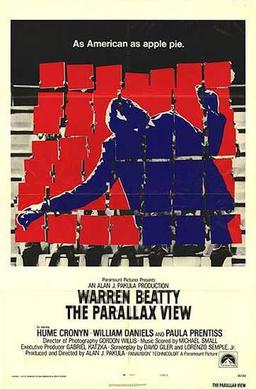
Alan J. Pakula was the 1970s premiere conspiracist filmmaker, with this film falling in between his two classics of the genre, Klute and All the President's Men. Naturally, this film falls right in the anxieties of the times with a fictionalized version of the Kennedy assassination, lots of manipulations and intrigues and double-fakes. In addition to what the country was learning about Watergate, this was also an era on the precipice of things such as the Church Committee and the Rockefeller Commission, both of which really only flowered in 1975, where such abuses as Cointelpro and MK-Ultra would be publicly revealed, but such exposures certainly put things such as the 'Ludovico Technique' in context, and the types of scenes in Parallax, or even Ipcress File or Billion Dollar Brain before it, began to look a lot less specualtive in hindsight.
I like this film, but I still blame Beatty, an actor who always kind of plays Warren Beatty and who had a well-earned reputation for throwing his weight around a film production before he decided to just start making the films himself. A less vain actor in the role would have been mighty preferable.
It's almost as if this film was a compromise of a more classic Cold War 'Nazis-in-hiding' conspiracy plot shoehorned into the more fashionable Kennedy-CIA adjacent stuff, it's a fairly pedestrian thriller from another journeyman British bloke, Ronald Neame. 
This is a modest little piece of intrigue that I enjoy a good bit. Lots of spooks and schemes, and is both clever and not entirely serious, which is the true sweet spot of conspiracism.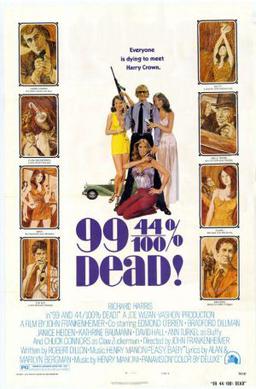
And meanwhile conspiracy pioneer John Frankenheimer just spent the year jacking off.
Posted by Rock  8/07/2024 12:38 am | #36 |
I went through a Crichton phase in high school but somehow never read or saw The Terminal Man.
I liked Parallax View, but my big takeaway was that tired and haggard Warren Beatty still looks like Warren Beatty.
Yeah, I remember finding 99 44/100 Dead pretty lame, but am hazy on the details.
I am not above abusing mod powers for my own amusement.
Posted by Jinnistan  8/07/2024 12:42 am | #37 |
Terminal Man and Internecine Project are the two recommends then, and I posted both in the Youtube thread, but I believe the Terminal Man was taken down, and Internecine in so-so quality. The film is fun though.
Posted by Jinnistan  8/10/2024 3:19 am | #38 |
Closing out the gritty cop films....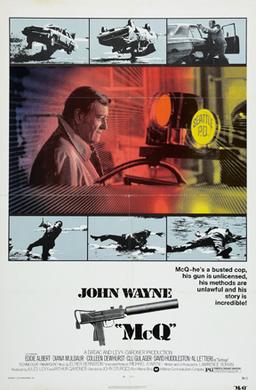
Here's an oddity. I'm not familiar with a single other John Wayne film that's set in a modern American city, but apparently Wayne never got over the fact that he turned down the role of Dirty Harry and felt the need to course correct at this late point in his career. The results are something like unintentional comedy, closer in spirt not to Harry bu Eastwood's earlier Coogan's Bluff, a ridiculously reactionary film which turns out to be as hilarious as a Dragnet episode about the dangers of LSD. Definitely an artifact of the times if not much else.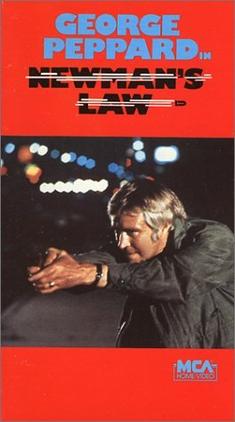
Just straight up DH rip-off. George Peppard has always had a face suitable only for TV (which may be why Wiki decided to use the VHS cover instead of the movie poster.)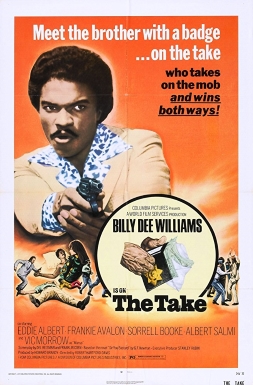
I've long made the distinction that not all "black" films from the '70s are "blaxploitation" - which were low-budget exploitation films made and distributed exclusively for dilapidated urban theaters. Though this distinction isn't always a trademark of quality either. This retread of the 'cop-on'the-take' tale was a mainstream capitalization of Billy Dee Williams' crossover succes at the height of his popular films with Diana Ross (Lady Sings the Blues, Mahagony). That doesn't mean it's anywhere as entertaining as his previous blaxploitation films like Final Comedown or Hit!.
Posted by Jinnistan  8/11/2024 8:03 pm | #39 |

Not the first women-in-prison film, this might be the most well known, and that's because it's probably the best as well. The debut of Jonathan Demme, all of whose early genre films (Crazy Mama, Citizens Band, Last Embrace) deserve critical revisiting, Caged Heat does happen to be smarter and sharper than the average exploitation flick. 
Even setting aside the pure pornographic films (which maybe Rock can help out with), I'm sure that there are plenty of the more soft-core variety of 1974 films of which I'm not too familiar, and which fall under the radar of the more official release lists. Emmanuelle however is special, both in its quality as genuine erotica and as one of the soft-core films which has fully crossed over into mainstream consciousness. It has, in fact, become the short-hand example of the era's genre. There's perhaps a couple of dozen Emmanuelle films (including, apparently, a reboot just this year), but the first one still reigns supreme. Sylvia Kristel is an underrated actress due to the prejudices of the imprurient.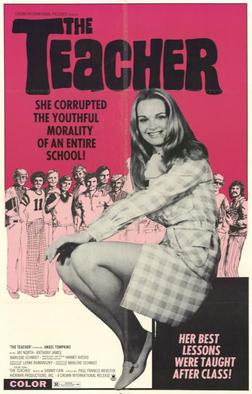
I'm not going to lie. I have no idea if this is a good movie or not. Probably not. Who cares? All that matters is that Angel Tompkins seduces Dennis the Menace. Tompkins, fortunately or not, does not in fact seduce the entire school.
This is one of those pictures with underage girls and incest that people don't want to admit is arousing. If it helps, the actresses were (barely) legal at the time.
As I mentioned, there are dozens of soft-core films from the year that I've either never seen or can't readily remember, especially those foreign ones like the Italian sex comedies. So I'll just note a couple off the top of my head that are memorable mostly for the actresses, respectively (and respectfully) Laura Antonelli and Gloria Guida.

Posted by Jinnistan  8/11/2024 9:40 pm | #40 |

This pseudo-porn has also effectively crossed over to the degree that most sci-fi fans have seen it out of a sense of duty. Compared to hardcore efforts (ala Ultra Flesh), these production values are pretty impressive, even involving a young Rick Baker on FX. One of the era's great midnight classics.
This film is far more significant as a landmark progenitor than as entertainment. It famously marked the debuts of Chevy Chase and Richard Belzer, and forged the low-budget sketch-style TV parody formula which would later be done much more successfully by Kentucky Fried Movie (although both owe their due to And Now For Something Completely Different). But the film is extremely dated and the laughs are very fitful and few. There's still a couple of inspired moments which stand up to time, like Koko the Clown and Safety Sam.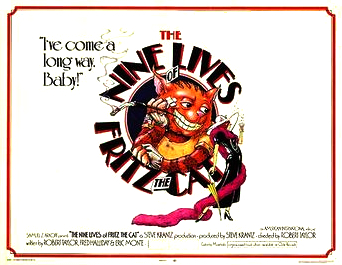
Lest you be unaware, this substandard "adult cartoon" has no relation to Ralph Bakshi, the visionary animator responsible for the original Fritz the Cat.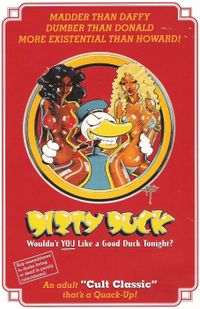
Such Bakshi rip-offs were unfortunately common in the wake of 1972's Fritz the Cat, with easily amused stoner audiences overly impressed with the subversion of normally innocuous cartoon characters doing and saying naughty stuff, all without any of Bakshi's underlying social commentary.
